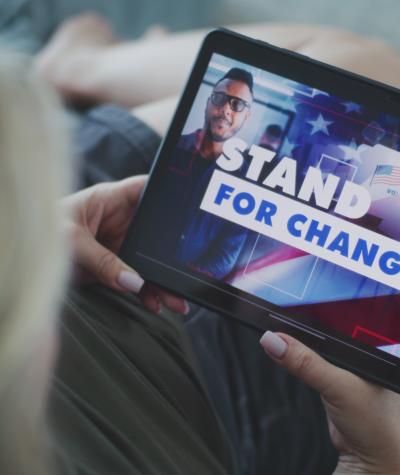As the 2024 election draws nearer by the day, voters — particularly in swing states like Pennsylvania and Georgia — are being flooded with campaign ads urging them to support certain candidates and political parties. Many of these ads also ask viewers to donate money.
Amidst this deluge of campaign ads, voters need robust legal guardrails that uphold transparency, limit the risk of corruption, and curb big money’s power and influence over the political process.
Unfortunately, the Federal Election Commission’s (FEC) recent failure to resolve a straightforward legal question about how campaign ads may be financed has opened a loophole that could undermine these sorely needed guardrails.
Many campaign ads end with a disclaimer stating that the ad was paid for by a candidate’s campaign, e.g., “Joe Biden for President.” However, a keen-eyed voter might notice that in recent years, these same campaign ads sometimes end with a disclaimer indicating that the ad wasn’t paid for by the candidate’s campaign, but by a different, often similar sounding group, e.g., “Biden Victory Fund.”
What’s the difference? And how does the distinction impact broader trends regarding money in politics?
This second group is a “joint fundraising committee” (JFCs), a type of entity that exists purely to raise money for its participants, which could include candidates’ campaigns, political party committees, leadership PACs, and even — according to a recent FEC decision — super PACs, the supposedly “independent” groups that can accept unlimited funds from billionaires and corporations.
Under the Federal Election Campaign Act (FECA), JFCs exist “solely” to raise funds for their participants — not to engage in candidate advocacy.
Nevertheless, in an advisory opinion request the FEC considered last week, the Democratic Senatorial Campaign Committee (DSCC), a national party committee, and two Senate candidates asked whether a JFC could pay for an ad that primarily advocates for candidates.
The answer to this request should have been an easy, resounding “no” to a proposal that openly skirts FECA’s contribution limits.
As Campaign Legal Center (CLC) explained in a comment, if a JFC can pay for ads that are virtually indistinguishable from a candidate’s own campaign ads, ultimately passing those costs along to the JFC’s participants, then those participants will effectively be paying for a huge chunk of candidate advocacy.
That’s money candidates would otherwise have to pay from their own campaigns.
For example, suppose a JFC with four participants — a candidate, their leadership PAC, their party’s national committee, and an allied super PAC — produces and pays for a 30-second ad that spends 26 seconds advocating for the candidate (“John McCain is a real leader, vote McCain!”) and four seconds asking viewers to donate to the JFC.
If these four participants had previously agreed to split fundraising costs evenly, 25% each, and this ad cost $100 to produce and distribute, then allowing the JFC to pay for the ad — essentially treating the whole ad, rather than the four seconds dedicated to soliciting funds, as a fundraising expense — would mean the candidate pays just $25 for nearly $100 worth of ad time supporting their candidacy, with the other three participants also each paying $25.
That’s a great deal for any candidate. Allowing JFCs to pay for candidate ads creates a new pathway for political parties and PACs to flout the legal limits on how much they can contribute to or spend in coordination with candidates.
There’s evidence that this is already happening: As another commenter noted, the National Republican Senatorial Committee (NRSC), the DSCC’s counterpart, has spent millions of dollars — through JFCs it participates in — to pay for ads that “are not fundraising ads” but are, indeed, “regular candidate ads” that simply flash a QR code that includes a donation link at some point.
Donald Trump’s 2024 presidential campaign has likewise “off-loaded” over $5 million in online ad costs onto a JFC that raises funds for (and splits costs between) Trump’s campaign and the Republican National Committee (RNC).
According to recent reporting, these JFC ads are “virtually identical” to the Trump campaign’s TV ads; the only difference is a “thin strip at the top with white text that urges people to donate to Mr. Trump.”
The real difference, of course, is financial: The Trump campaign pays just half the cost of these ads — with the RNC footing the other half of the bill.
Unfortunately, the FEC, which is charged with implementing and enforcing federal campaign finance laws, deadlocked 3-3 along party lines and did not issue a decision.
This means the FEC couldn’t agree on the simple question of whether a JFC’s payment for candidate advocacy would violate the law.
Although the FEC did not affirmatively approve this request, the agency’s deadlock signals to candidates, PACs, and political parties alike that they can use JFCs to pay for candidate ads with a fleeting solicitation tacked on at the end — thereby flouting FECA’s contribution limits — without facing potential consequences.
This creates a major loophole allowing JFC participants like political party committees and PACs to circumvent crucial campaign finance laws, including contribution limits and prohibitions, which ultimately allows more big money donors to pay for candidate advocacy.
This loophole is impacting more than just advertising: JFCs are also paying for Trump’s campaign rallies by “treating those events as fund-raisers” with the addition of “backstage photo lines for contributors or donor round tables.”
Allowing JFCs to pay for candidate advocacy and campaign activity erodes the legal guardrails that exist to prevent actual and apparent corruption, hold candidates and committees accountable to the public, and prevent big-money donors from drowning out the voices of everyday Americans.
What looks like a terrific deal for political parties and candidates will most likely end up costing voters.

